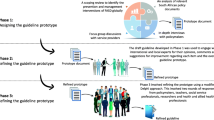Abstract
There is a lack of systematic research on the training of clinicians toward providing counselling services and support to individuals with Fetal Alcohol Spectrum Disorder (FASD). The aim of this qualitative project was twofold: (1) to develop and pilot a clinical consultation process that would address clinicians’ reported need for greater communication and information sharing in serving clients affected by FASD; and (2) to build a model of FASD-informed clinical counselling practice by examining this consultation process and by capturing the experiences of clinicians who were involved. Findings from focus groups and meeting minutes are reported with respect to the model’s focus on reflection, communication, and action.

Similar content being viewed by others
References
Blackburn, C., & Whitehurst, T. (2010). Foetal alcohol spectrum disorders (FASD): Raising awareness in early years settings. British Journal of Special Education, 37(3), 122–129.
Burd, L. (2007). Interventions in FASD: We must do better. Child: Care, Health and Development, 33, 398–400.
Chudley, A. E., Conry, J., Cook, J. L., Loock, C., Rosales, T., & LeBlanc, N. (2005). Fetal alcohol spectrum disorder: Canadian guidelines for diagnosis. Canadian Medical Association Journal, 172, S1–S21.
Israel, B., Schulz, A. B., Parker, E. A., & Becker, A. B. (1998). Review of community-based research: assessing partnership approaches to improve public health. Annual Review of Public Health, 19, 173–202.
Masotti, P., Longstaffe, S., Gammon, H., Isbister, J., Maxwell, B., & Hanlon-Dearman, A. (2015). Integrating care for individuals with FASD: results from a multi-stakeholder symposium. BMC Health Services Research, 15, 457–470.
Maykut, P., & Morehouse, R. (1994). Beginning qualitative research: a philosophic and practical guide. London: The Falmer Press.
Paley, B., & O’Connor, M. J. (2011). Behavioral interventions for children and adolescents with fetal alcohol spectrum disorders. Alcohol Research and Health, 34, 64–75.
Pei, J., Denys, K., Hughes, J., & Rasmussen, C. (2011). Mental health issues in fetal alcohol spectrum disorder. Journal of Mental Health, 20(5), 438–448.
Rasmussen, C. (2005). Executive functioning and working memory in fetal alcohol spectrum disorder. Alcoholism, Clinical and Experimental Research, 29, 1359–1367.
Sandelowski, M. (2000). Whatever happened to qualitative description? Research in Nursing & Health, 23, 334–340.
Streissguth, A. P., Barr, H. M., Kogan, J., & Bookstein, F. L. (1996). Understanding the occurrence of secondary disabilities in clients with fetal alcohol syndrome (FAS) and fetal alcohol effects (FAE): Final report to the Centers for Disease Control and Prevention. Seattle: University of Washington, Fetal Alcohol and Drug Unit.
Thorne, S. (2008). Interpretive description. Walnut Creek, CA: Left Coast Press.
Wheeler, J. A., Kenney, K. A., & Temple, V. (2013). Fetal alcohol spectrum disorder: Exploratory investigation of services and interventions for adults. Journal on Developmental Disabilities, 19(3), 62–75.
Wilton, G., & Plane, M. B. (2006). The family empowerment network: a service model to address the needs of children and families affected by fetal alcohol spectrum disorders. Pediatric Nursing, 32(4), 299–306.
Woolfe, R., Strawbridge, S., Douglas, B., & Dryden, W. (Eds.). (2010). Handbook of counselling psychology. London, England: Sage Publications Ltd.
Author information
Authors and Affiliations
Corresponding author
Ethics declarations
The authors report no conflicts of interest. This research with human subjects was conducted with approval from the University’s Research Ethics Board. All participants provided informed consent to participate in the study.
Rights and permissions
About this article
Cite this article
Tremblay, M., Pei, J., Plesuk, D. et al. Development of a Clinical Practice Model for Serving Clients with Fetal Alcohol Spectrum Disorder. Int J Adv Counselling 39, 82–97 (2017). https://doi.org/10.1007/s10447-017-9284-0
Published:
Issue Date:
DOI: https://doi.org/10.1007/s10447-017-9284-0




